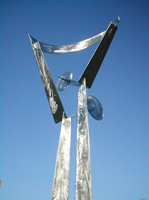
Bryn Mawr College

 |
Center Bryn Mawr College | 
|
April 17, 2003
Melissa Pashigian (Anthropology)
Imparting the
Social in Science
Hoping to draw attention to what we have NOT talked about during the course of our conversations (and to nudge us to speculate WHY not), Melissa posed five related questions about how culture and social relations are infused in the making of science and its products:
Acknowledging that she had often felt "alone as a social scientist" during our year-long conversations about the "two cultures," Melissa invited us to think together about "where anthropology might get situated" in our discussion. IS there a "science of culture"? Is it anthropology? If so, what might it tell us about the repeated tendency of these discussions to emphasize the "culture of science"? Anthropology is a "bridging discipline" between the natural sciences and the humanities (with four branches or subdivisions of its own: physical, archeological, linguistic and socio-cultural). It considers itself a science because it has a set of replicable methodologies for collecting ethnographic data.
But does anthropology, like many other social scientific and humanistic disciplines, privilege its "scientific" qualities as a (circular?) way of claiming its rigorous, successful pursuit of certainty and truth? Would most scientists "recognize themselves" in such a description of what constitutes science? If not, what then marks the discontinuity between "science" and "non-science"? Is it the distinction between having something to falsify, vs. making acts of interpretation? (Does the act of falsficiation presume truth? If not, what distinguishes it from interpretation? Can the act of interpretation be as rigorous as that of falsification?) Another way to differentiate scientists from others might be in terms of major life activity: knocking down the theories of others, vs. creating new ones.
Or is there no useful demarcation to be made between science and the activity that all humans engage in: the continual process of making new stories and destroying old ones? It was suggested that the current conception of science used by "wanna-bes" in the social sciences and humanities was not created by scientists, but by the formal realist philosopher and historian Karl Popper, who selected as prototypical a particular "piece of science" consistent with his own perspective on truth. What if Popper and the philosophers of science who followed him had selected not physics but biology as their prototype for what it means to do science? Then the contemporary image of science would be a very different one: a picture of continual change, an elaboration of multiple stories not grounded in concepts of truth and reality. Perhaps there is nothing in the "citadel" of science but Popper's creation, and aspirations to become "scientific" are not actually copying science, but a small subset of a wide range of scientific activities. Why was physics so long taken as the model of what science is? In reaction to the horrors of World War II, a desire to find certain universals that cut across all human cultures?
Discussion is invited to continue on our on-line forum; the in-person format will conclude for the semester next Thursday, April 24, when Michael Krausz, of the Bryn Mawr Philosophy Department, will speak about "Interpretation and Its Objects."
Michael's books, Rightness and Reasons and Limits of Rightness, center their discussions around a distinction that divides interpreters of cultural achievements into two groups. In one group there are those who assume that for any object of interpretation-- say, a work of art, music, or literary text--there must be only one single admissible interpretation. In the other group there are those who assume that for some objects of interpretation more than one interpretation is admissible. Michael calls the first group singularists and the second group multiplists.
In this talk Michael will present three puzzles and raise a question about science.
Michael will also ask whether science should be understood as a cultural achievement and whether singularism is a criterion of science.
Home
| Calendar | About
| Getting Involved
| Groups | Initiatives | Bryn Mawr Home | Serendip Home
Director: Liz McCormack -
emccorma@brynmawr.edu
| Faculty Steering Committee
| Secretary: Lisa Kolonay
© 1994-
, by Center for Science in Society, Bryn Mawr College and Serendip
Last Modified:
Wednesday, 02-May-2018 11:57:05 CDT